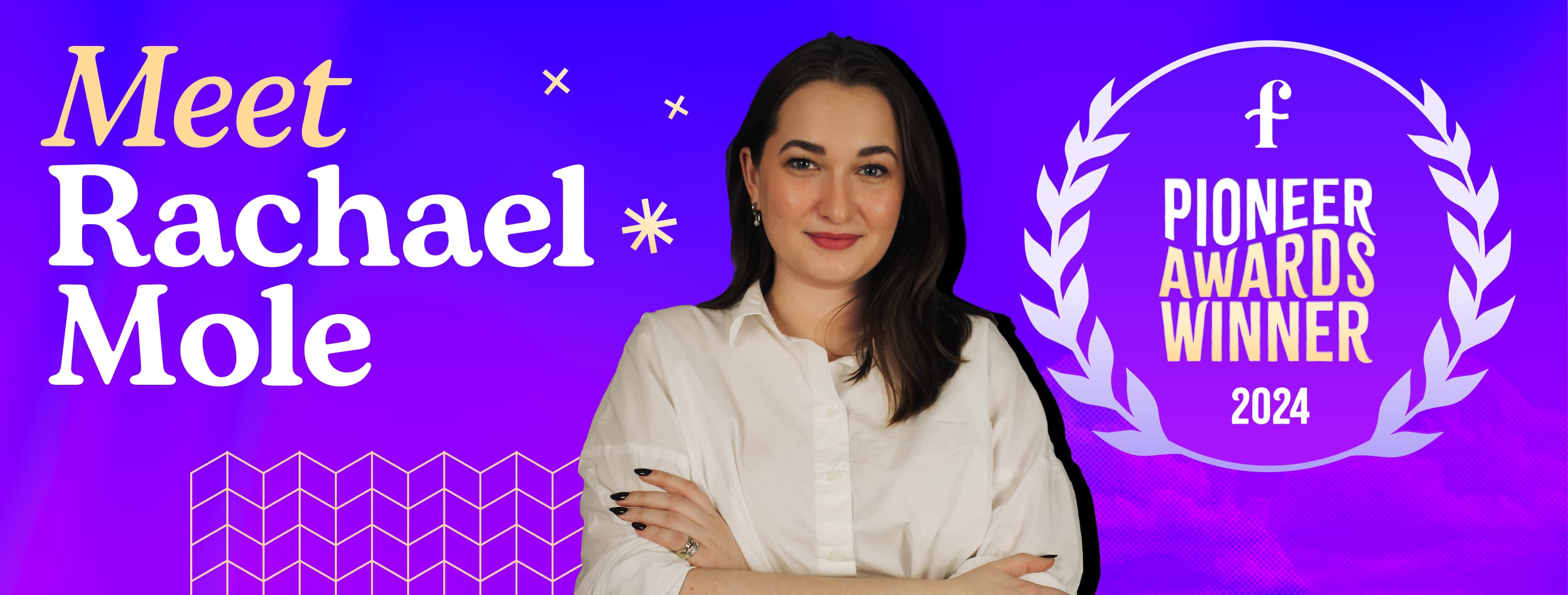Pioneer Profile: Rachael Mole
Meet Rachael Mole, an award-winning specialist in workplace accessibility. Rachael’s journey began with a commitment to breaking down barriers in education, society, and the workplace. Today, she advocates for inclusion as a catalyst for cultural change.
12th Nov 2024

It’s time that we recognise the people behind the evolving world of work. Our working lives have shifted to being more inclusive, more people-centric, more flexible, and just plain better for both employees and companies.
These changes didn’t just happen: they were put into place and upheld by individuals and teams working to create a better working future for everyone.
So we’re finally putting the spotlight on the people who make great companies great: the people-people.
People-people are crucial to the success of every company. They find you the talent that drives you forwards, and they’ve taken on an increasingly strategic role in the past few years – often taking on responsibility for mental health, diversity and inclusion, culture, EVPs, Employer Branding and team happiness.
Read more about the Pioneers List and go behind the scenes to understand how and why we’ve selected our Pioneers.
We were lucky enough to speak with Rachael Mole, an award-winning specialist in workplace accessibility.
Tell us a little bit about your career history, and how you got to where you are now. What were the key milestones?
My journey into the world of accessible and inclusive work culture began with my own experience as a disabled person. Living with disabilities since my early teens shaped my understanding of the barriers people face accessing education, wider society and in the workplace. I knew I wanted to focus my career on transforming workplaces to be genuinely inclusive. Key milestones have included founding my consultancy, where I work with organisations across the UK to develop accessible, people-centred management practices. I completed my Churchill Fellowship in 2024 when I published international research on the innovation that comes from building inclusive work cultures. I was recently appointed to the Disabled Persons Transport Advisory Board, advising the government on accessible travel. For me, accessibility is a core part of business strategy, not just a compliance checkbox.
When did you become interested in the future of work?
Accessibility and inclusivity often get overlooked in traditional settings. My interest in the future of work has grown alongside my experiences and insights as I’ve worked to research, advocate for and build inclusive work cultures. As technology advanced, so did the potential to create work environments that are genuinely adaptable for everyone. These developments have led me to explore how disability and accessibility are considered in building and deploying technologies, specifically when it comes to people management and building inclusive work cultures, and the realisation that, sadly, it’s hardly ever considered at all, with potentially harmful effects. Technology has the power to be a fantastic equaliser in the workplace for those traditionally and historically excluded.
What is the most impactful change that you’ve implemented?
One of the most impactful changes I’ve helped organisations achieve is rethinking their approach to disability from a “challenge” to a valuable driver for innovation. By guiding teams through workshops and strategic sessions and considering accessibility from an operational perspective and not a HR one, I’ve helped businesses embrace accessibility not only to support their disabled employees but also to foster a more substantial, more adaptable workplace for everyone. This shift in mindset has led to lasting cultural change in these organisations, helping them to see inclusion as a strategic asset rather than a legal obligation.
What’s the biggest challenge of being in your role/industry right now?
One of the biggest challenges is the pace of change in larger organisations. While awareness of accessibility and inclusivity is growing, there’s often a gap between acknowledging the need for change and taking meaningful, sustained action. People frequently treat accessibility as a tick-box exercise rather than an opportunity for real innovation and growth, which can be frustrating when striving for genuine inclusion.
What do you think the next big trend is in working culture?
Hyper-personalised work experiences will be the next big trend for companies who want to stay relevant over the next decade. Hybrid and remote work are becoming the new norm (no matter what the media would have you believe, this is the first thing most people are asking for), and people want workplaces that accommodate their unique needs. Whether they have a disability or not, genuinely flexible working supports people who are caregivers, single parents, new parents, commuters – the list is endless. Accessibility benefits organisations and individuals alike; more tailored technology solutions, flexible policies, and inclusive tools can adapt to the needs of everyone. When you build a solid foundation with disabled employees in mind, you’re creating all the tools you need to support every other employee in your business. It’s an exciting shift that moves us toward more human-centred, accessible workspaces.